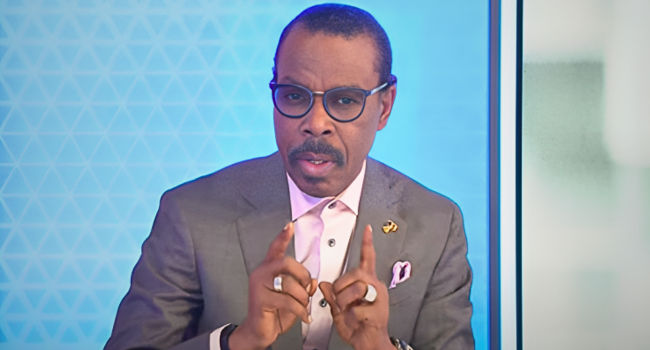
“Fiscal measures will complement monetary control tools and diesel prices will fall further below 1000 naira, thanks to Dangote,” he said.
The Managing Director of Financial Derivatives Company Limited, Bismark Rewane, says with the commencement of diesel production at the Dangote Refinery, the price of diesel per litre will fall below N1,000 from the current price of N1,500. Rewane was a guest on Channels Television’s News At 10 during the week where he reviewed the recent hike in interest rates by the Central Bank of Nigeria (CBN).
Excerpts:
Last month, the interest was raised to 22.75% but now the latest is 24.75%. Are we tightening or choking the economy?
That’s the million-dollar question, right? Just four weeks ago, it went up by 400 basis points and now we’ve gone up by 200 basis points again. But what we seem to forget is that for several months there was no, no activity. So. what we did last time was catch up arrears of interest rate hikes. And now we’ve done it 200 basis points again. It is tightening, it’s not choking. But you know, you can’t make an omelette without breaking eggs. So the question is what’s gonna happen to inflation? Right?
I think it is big, especially food inflation
Food and core inflation. We are beginning to see signs (of) improvement. One of the big issues that troubling minds today is what’s happening to the naira because the question is – is a weak naira causing inflation or is inflation causing a weak naira?
The exchange rate has appreciated by 45%. Today, it’s trading at N1320, it went up to N1915. So the naira has become 45% stronger in a matter of six weeks. GDP still remains at the same number of 3.46%. But the big elephant in the room is money supply growth, the money supply is now 95 trillion naira. And I said it again, 95 trillion naira. It has expanded by 79%. So if your GDP is at 3.4% and your money supply grows by 79%, ab initio, you are 73% underwater and that is the big issue. So we need to tighten at this time, you can’t call it choking.
The breakdown of inflation shows that 31.7% is headline inflation as year on year. If you bought food last year compared to this year, it should be 31% higher. Food inflation, the big stroking factor is 37%. But what what are we seeing? We see here that inflation begins to decline in May and June but there is a minimum wage issue.
I heard the central bank governor saying that inflation is gonna come down in May. God bless Nigeria. But the truth is that with the minimum wage, you are bound to have another spike in inflation but it’s not gonna break the bank. It’s just gonna mean that we are going to have to deal with inflation over a longer period.
So, the most important thing is how it affects you as an individual. And we’re gonna look at that.
Diesel is a major stocking factor.
Well, on the retail side, it’s N1,500. Dangote refinery has already started putting diesel in the market and people are buying that. If it stays at N1100 and continues to go in that direction, this will help to bring down inflation significantly.
The bakers for one because they are funding their furnaces and their ovens with diesel, you are gonna see that improve. So for cement manufacturers and bakers, this is good news.
Now, narrow weakness talking inflation. This is where when the exchange rate went all the way up, it led to inflation coming down. Now, that the inflation exchange rate is appreciating, it will come down. But you see in the economic state prices are sticky downwards. So we are going to see and appreciate a reduction in prices but much slower than when the prices went through the roof. That pass-through contributes 50% to headline inflation. N1,950 to $1 in February. After the February MPC meeting, it came down to 1,600 naira per dollar today. It’s 1,320 it could be heading towards 1,250 very soon.
Should we be worried about that?
No.
Is the naira going to tumble again? The answer to that is no.
Why? $7 billion of verified foreign commitments have been cleared, so the central bank says. Diaspora remittances of about $1.3 billion are likely to be coming in but we keep that aside. Oil production is up at 1.4 million barrels a day and foreign portfolio flows have come in because of high interest rates at 2.3. Crude oil price at $86 a barrel is good. Cocoa is now at a record high historical high $9,000 for a tonne. The average price last year was $2,000 and we are doing 250,000 tons this year. So cocoa would bring about $3 billion if it stays this way. So it’s good. The wet floor is there, the naira is not going to tumble again.
Now, let’s go down. In February, a bag of rice was N80,000. It went up to N95,000 and now it’s down to N88,000 a bag. We expect by June, it will come down to N85,000 because Ramadan and fasting are over. Now, the price of a loaf of bread is 1,300 in February, it is now at 1,600. We expect it to drop to 1400.
The impact of exchange rate appreciation?
This is where it gets interesting, very interesting, international school fees. Even though the naira has appreciated by 45%, your international school fees will not go down by more than 15%. But it’s good. It’s green. The cost of medical tourism. Yes, it goes down by about 20%. If you are going outside or bringing international doctors here, 20%.
Your airfares, international airfares. Yes, the naira has appreciated but we expect airfares to reduce by 25%. So if you are travelling abroad, good news for you this summer. The diesel effect on intercity transport fares is still the same and actually, intercity transport fares will drop
The only thing that doesn’t stay that stays the same is your house rent, your house rent remains the same.

So what does a high interest rate mean? The stock market is gonna dip some more. Higher borrowing costs, higher loan default rate and increased marginal propensity to save.
So, in closing, the conclusion is that what next? The next MPC meeting is May 20th and 21st. Inflation will remain elevated because of the minimum wage and other things. But the naira appreciation will help it and the diesel reduction will help it. It will moderate towards the end of the year to 23%.
The MPC will maintain the status quo in May. Month-on-month inflation will reduce in March and a stable naira will attract more foreign portfolio inflows. Fiscal measures will complement monetary control tools and diesel prices will fall further below 1000 naira, thanks to Dangote.







